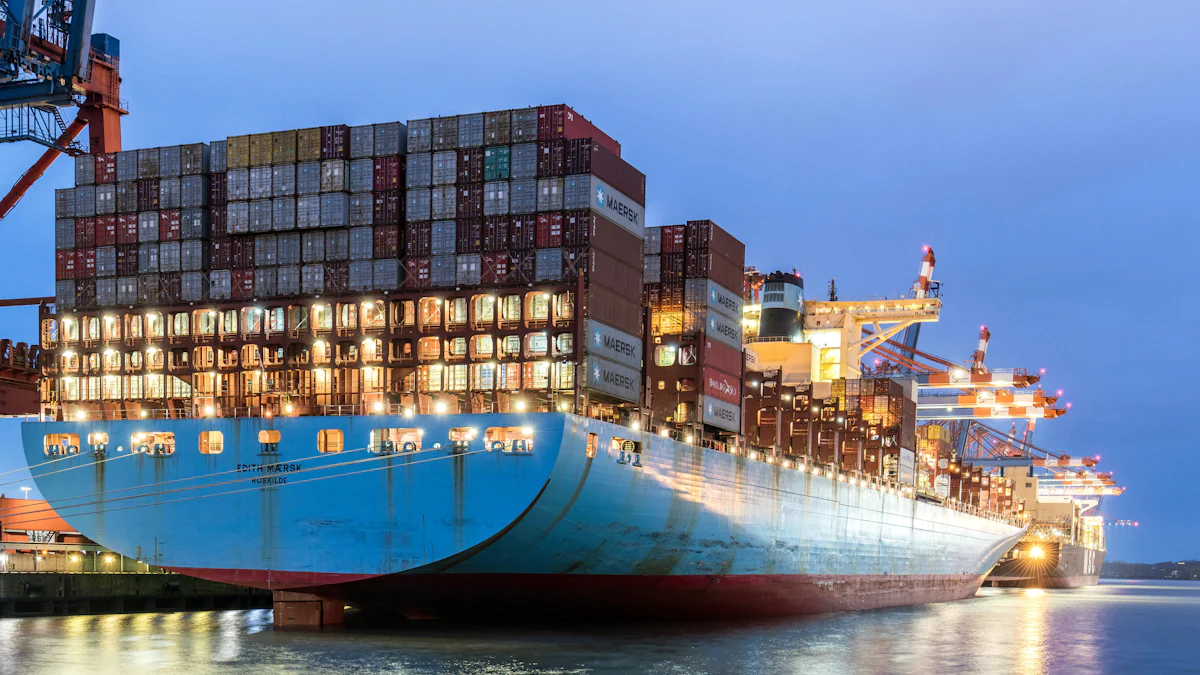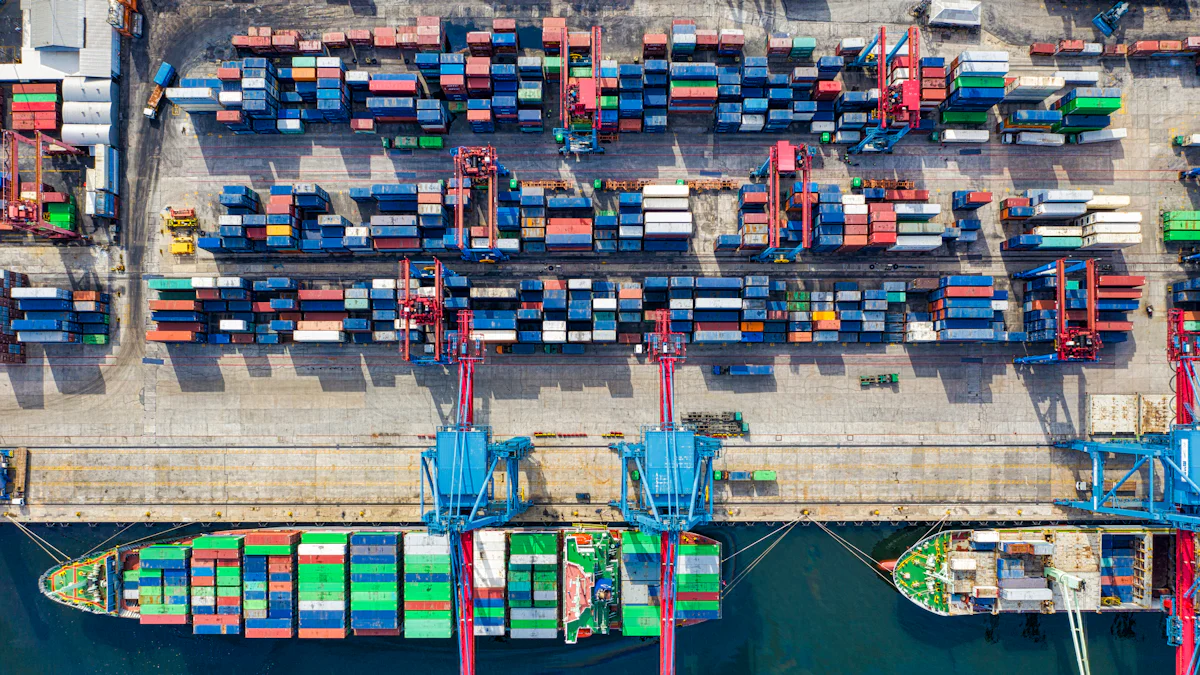2024 Logistics Industry Projections and Future Insights

The Logistics industry analysis for 2023 showcased a steady growth rate, setting the stage for the upcoming year. Understanding future projections is crucial for businesses to adapt and thrive in the dynamic market landscape. This blog will delve into key areas such as Technological Advancements, Sustainability, E-commerce, Competitive Landscape, and more to provide valuable insights for industry players looking to stay ahead of the curve.
Key Trends in the 2024 Logistics Industry

Technological Advancements
Incorporating Automation and Robotics into operational frameworks has become a strategic priority for many logistics companies. The integration of robotic technologies streamlines warehouse processes, enhancing efficiency and accuracy. According to the MHI Annual Industry Report (2023), nearly 80% of respondents are planning investments in this area to optimize their logistical operations.
The Internet of Things (IoT) is revolutionizing supply chain management by enabling real-time tracking and monitoring of goods in transit. This interconnected network of devices enhances visibility across the entire logistics process, facilitating proactive decision-making and minimizing disruptions. Emerging technologies within the logistics sector are leveraging IoT capabilities to ensure seamless connectivity and data-driven insights.
Artificial Intelligence (AI) and Machine Learning algorithms are reshaping the logistics landscape by driving predictive analytics and intelligent decision-making. These technologies analyze vast amounts of data to optimize routes, predict demand patterns, and automate repetitive tasks. The Global Logistics Industry Report 2023 highlights that AI can significantly reduce transit times compared to traditional methods, showcasing its transformative potential in the sector.
Sustainability and Green Logistics
The shift towards Eco-friendly Transportation Solutions is gaining momentum as companies prioritize environmental sustainability in their operations. By embracing electric vehicles, biofuels, and alternative energy sources, logistics firms are reducing their carbon footprint while promoting eco-conscious practices. Sustainable transportation solutions not only contribute to environmental conservation but also enhance brand reputation and customer loyalty.
Innovations in Sustainable Packaging play a vital role in minimizing waste generation and optimizing resource utilization throughout the supply chain. Companies are exploring biodegradable materials, reusable packaging options, and efficient packaging designs to promote circular economy principles. Embracing sustainable packaging innovations aligns with consumer preferences for environmentally responsible products while fostering a greener logistics ecosystem.
E-commerce and Last-Mile Delivery
The exponential growth of E-commerce continues to reshape the logistics industry, driving demand for agile supply chain solutions tailored to online retail requirements. As more consumers opt for digital shopping experiences, logistics providers are adapting their strategies to meet evolving e-commerce needs efficiently. The KPMG Supply Chain Trends 2024 report emphasizes that AI, IoT, data analytics, and cloud technologies are pivotal in enabling smart logistics operations optimized for e-commerce dynamics.
Innovations in Last-Mile Delivery are enhancing customer satisfaction by ensuring swift order fulfillment and seamless delivery experiences. Leveraging advanced routing algorithms, autonomous vehicles, and drone delivery systems streamline last-mile operations while reducing delivery times. Forbes Tech Council's insights underscore how AI and blockchain technologies are poised to revolutionize real-time shipment tracking capabilities within last-mile delivery networks.
Competitive Landscape
Major Players in the Industry
Market Leaders
Kuehne + Nagel: Retained its top position despite a decrease in airfreight volumes by 249,000 metric tons.
DHL Supply Chain & Global Forwarding: Maintained the second spot with a decline of 230,000 metric tons in airfreight volumes.
Emerging Companies
Ryder Supply Chain Solutions: Advanced to the second position after acquiring Cardinal Logistics.
Amazon: Transformed into a significant player by establishing an extensive network of fulfillment centers.
Strategic Partnerships and Mergers
Recent Mergers and Acquisitions
Ryder Supply Chain Solutions acquired Cardinal Logistics, propelling its position in the industry.
UPS Supply Chain Solutions expanded its service portfolio through strategic acquisitions.
Impact on Market Dynamics
The mergers and partnerships within the logistics sector are reshaping market dynamics, fostering innovation and operational synergies.
Collaborations between major players are driving efficiency gains and enhancing service offerings to meet evolving customer demands.
Future Outlook and Predictions

Economic Factors Influencing the Industry
Global Economic Trends
The global logistics market anticipates significant growth, driven by evolving economic landscapes worldwide.
Increasing trade volumes across international borders are propelling the demand for efficient logistics solutions.
Market analysts project a surge in cross-border e-commerce activities, influencing logistical strategies on a global scale.
Regional Economic Developments
Regional economic shifts are reshaping supply chain dynamics, emphasizing the need for adaptable logistical frameworks.
Emerging markets are witnessing rapid infrastructure developments, presenting lucrative opportunities for logistics expansion.
Localized consumer preferences are influencing regional logistics trends, necessitating tailored supply chain approaches.
Regulatory Changes and Their Impact
New Regulations
Evolving regulatory frameworks are introducing stringent compliance requirements for logistics operations.
Environmental sustainability regulations are driving the adoption of eco-friendly transportation practices within the industry.
Data protection laws and cybersecurity measures are becoming pivotal considerations in securing logistical networks.
Compliance Challenges
Logistics providers face challenges in aligning operational practices with dynamic regulatory mandates.
Ensuring transparency and accountability throughout the supply chain is paramount to meet regulatory standards.
Adapting to changing compliance landscapes demands continuous monitoring and proactive adjustments.
Consumer Behavior and Market Demand
Shifts in Consumer Preferences
Changing consumer expectations are steering logistics towards personalized services and seamless experiences.
Demand for sustainable products is influencing purchasing decisions, prompting eco-conscious supply chain initiatives.
Enhanced visibility and real-time tracking capabilities cater to consumer preferences for transparent order fulfillment processes.
Demand Forecasts
The rise of omnichannel retailing is driving demand for integrated logistics solutions that bridge online and offline shopping experiences seamlessly.
Urbanization trends are fueling last-mile delivery innovations to meet growing consumer expectations for convenience and speed.
Technological advancements in inventory management systems will optimize stock levels to align with fluctuating market demands.
Implementing AR/VR technology in logistics has resulted in a productivity surge of over 40%, reducing errors, and boosting efficiency.
AI technology adoption has led to a 15% reduction in logistics costs, optimized inventory levels by 35%, and improved service levels by 65%.
Developing a value-driven roadmap aligned with clear purposes enhances cost savings, efficiency, customer satisfaction, and innovation within the supply chain.
Analyzing data from various sources like vehicle telematics and IoT devices drives informed decision-making processes in the logistics sector.
The logistics industry plays a vital role in lowering transport expenses globally while elevating brand standards through efficient resource storage and transportation.
See Also
Best 5 Logistics Courses for 2024
Revolutionary Logistics Tech: Exploring Tomorrow
Understanding Logistics Risk Trends: Impact Deciphered
